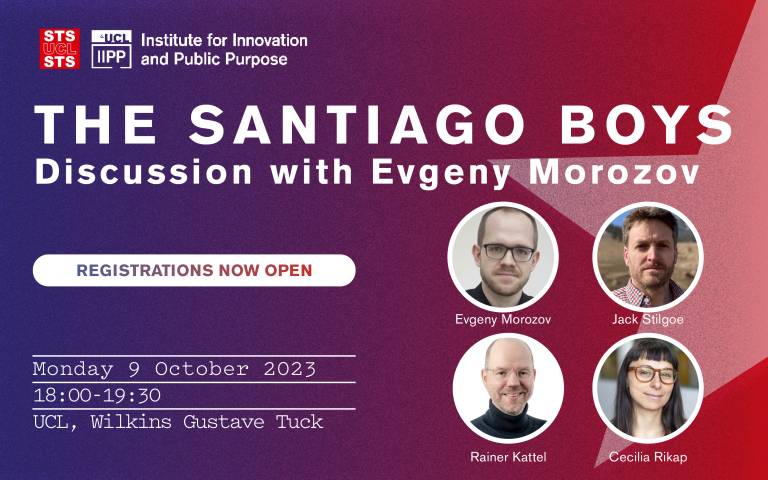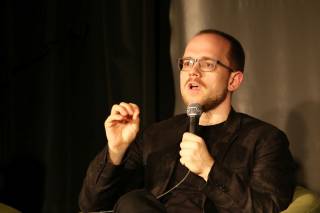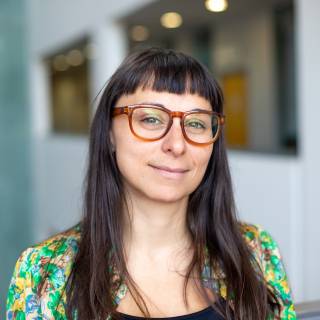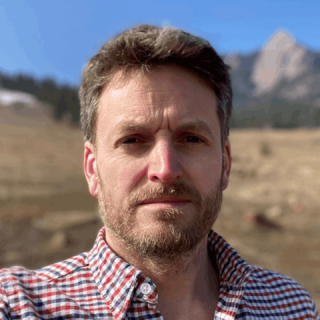The Santiago Boys: Discussion with Evgeny Morozov
09 October 2023, 6:00 pm–7:30 pm

A panel discussion on The Santiago Boys co-hosted by UCL IIPP and UCL Department of Science and Technology Studies (STS) with Evgeny Morozov in conversation with Cecilia Rikap and Jack Stilgoe chaired by Rainer Kattel.
Event Information
Open to
- All
Organiser
-
UCL Institute for Innovation and Public Purpose
Location
-
Gustave Tuck Lecture TheatreGower StreetLondonWC1E 6BT
Date: Monday 9 October 2023 | Time: 18:00 - 19:30 pm (BST) UK Time
About this event:
As the world ponders the growing power of Big Tech, the pioneering experience of Salvador Allende's Chile merits urgent examination. Not only did his Popular Unity government confront the much-feared tech giants of the day, but they also ventured to build Project Cybersyn, their own computer system for managing the Chilean economy. What relevance do those efforts have in today's digital world?
This event will feature a presentation of The Santiago Boys, a nine-part podcast about the Chilean experience, by its creator, Evgeny Morozov. It will reflect both upon the contemporary relevance of Allende-era debates and the challenges and opportunities of podcasting as a genre. The presentation will be followed by a discussion panel chaired by Prof. Rainer Kattel.
Meet the panel:
- Evgeny Morozov | Author and Founder of The Syllabus, a non-profit knowledge curation initiative
- Cecilia Rikap | Head of Research and Associate Professor in Economics, UCL Institute for Innovation and Public Purpose
- Jack Stilgoe | Professor of Science and Technology Policy, UCL Department of Science and Technology Studies
Chair:
- Rainer Kattel | Deputy Director and Professor of Innovation and Public Governance, UCL Institute for Innovation and Public Purpose
Please note this event will take place in person only at UCL Wilkins Gustave Tuck Lecture Theatre. Limited spaces will available on a first come first served basis.
About the Speakers
Dr Evgeny Morozov
Author and Founder at The Syllabus

In 2011, Morozov published his first book, The Net Delusion: The Dark Side of Internet Freedom (PublicAffairs), a New York Times Notable Book of 2011 and awarded the 2012 Goldsmith Book Prize from the Harvard Kennedy School. In addition to exploring the impact of the Internet on authoritarian states, the book investigates the intellectual sources of the growing excitement about the liberating potential of the Internet, and links it to the triumphalism that followed the end of the Cold War.
Morozov’s second book, To Save Everything, Click Here: The Folly of Technological Solutionism (PublicAffairs, 2013), published in German as Smarte neue Welt: Digitale Technik und die Freiheit des Menschen (Karl Blessing Verlag, 2013), examines the effects of technology on subjects ranging from politics and criminology to weight loss. Technology, Morozov proposes, can be a force for improvement—but only if we keep “solutionism” in check and learn to appreciate the imperfections of liberal democracy. Morozov writes, “There are good reasons not to run our politics as a start-up . . . good reasons to value subjective but high-quality criticism, even if it doesn’t stem from the ‘wisdom of crowds.’”
Evgeny Morozov is creator to the recently released podcast The Santiago Boys. He's also the founder of The Syllabus, a non-profit knowledge curation initiative. Morozov holds a PhD in history of science from Harvard University, and has written for a variety of publications.
Dr Cecilia Rikap
Head of Research and Associate Professor in Economics at UCL Institute for Innovation and Public Purpose

Cecilia’s research is rooted in the international political economy of science and technology and the economics of innovation. She currently studies the rising concentration of intangible assets leading to the emergence of intellectual monopolies, among others from digital and pharma industries, the distribution of intellectual (including data) rents, resulting geopolitical tensions and the effects of knowledge assetization on the knowledge commons and development. She has published two books on these topics. 1) “Capitalism, Power and Innovation: Intellectual Monopoly Capitalism uncovered” (Routledge), recently won the EAEPE Joan Robinson Prize Competition. 2) “The Digital Innovation Race: Conceptualizing the Emerging New World Order” (Palgrave), co-authored with B.A.K. Lundvall, focuses on the artificial intelligence race and clashes of power between the US and Chinese Big Tech, the US state and the Chinese states. Her recent work includes corporate planning of global production and innovation systems driven by intellectual monopolization and how these leading corporations, in particular tech giants, are developing state-like features, thus reshaping core and peripheral states. More about Dr Cecilia Rikap
Professor Jack Stilgoe
Professor of Science and Technology Policy at UCL Department of Science and Technology Studies

Professor Rainer Kattel
Deputy Director and Professor of Innovation and Public Governance at UCL Institute for Innovation and Public Purpose

Professor Kattel has also served on various public policy commissions, including the Estonian Research Council and European Science Foundation. He has worked as an expert for the OECD, UNDP and the European Commission, and served as a member of E-Estonia Council advising the Prime Minister of Estonia. Currently, he leads the Estonian Government’s Gender Equality Council.
He has published extensively on innovation policy, its governance and specific management issues. In 2013, he received Estonia's National Science Award for his work on innovation policy.
Rainer received his BA in political philosophy in 1996, MA in Classics in 1998, and PhD in Public Administration in 2001 (all University of Tartu, Estonia).
More about Professor Rainer Kattel Close
Close

